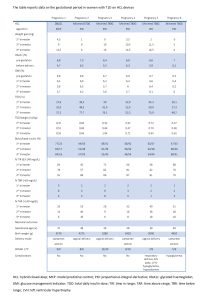Background: It is well-known that pregnant women with type 1 diabetes (T1D), when compared to non diabetic, have increased rates of obstetrical and perinatal complications, encompassing prematurity, hypoglycaemia, respiratory distress and foetal macrosomia. In this population compelling evidence supporting the use of hybrid closed-loop (HCL) over multiple daily injections (MDI) is still lacking, though women on HCL therapy in pregnancy experienced a reduction of the physical and mental burden of diabetes management. Aims: The aim is to share our experience on T1D pregnancies managed on HCL systems. Methods: We collected data on the gestational period and neonatal outcomes of 6 pregnancies in 5 women with T1D attending the Diabetology Service of S. Maria della Misericordia Hospital in Perugia who gave birth between January 1st 2020 and December 31st 2023. The subjects were being managed on different HCL systems (one on DBLG1, one on Minimed 670G, four on Minimed 780G) before the pregnancy and were already trained to use the devices. Results: The mean value of HbA1c before pregnancy was 6,7%±0,3 (mean±SD) and lowered to 5,8%±0,6 before delivery as well as the glucose management indicator (GMI) without increasing the hypoglycaemia rates. By the 3rd trimester, the time spent in range (TIR) was above the recommended target of 70% for 5 women and the other one reached 68% of TIR (Pregnancy 2). 3 neonates were born large-for-gestational-age: 1 (Pregnancy 5) had a birthweight above 5000 g and reported several complications, the other 2 were healthy. 4 women were reverted to manual mode during the 2nd trimester, 2 of them (Pregnancy 1 and 6) completed the pregnancy on HCL. Conclusions: We shared our experience of an off-label use of Minimed and DBLG1 devices in pregnancies complicated by T1D. Although none of these were approved for pregnancy, as their target values are higher than those recommended in pregnancy, 2 women were managed on HCL for their entire gestation. Encouraging results have recently arrived from the Automated insulin Delivery Among Pregnant women with T1D study, but further data are needed to support the superiority of HCL over other treatment regimens in this population.


